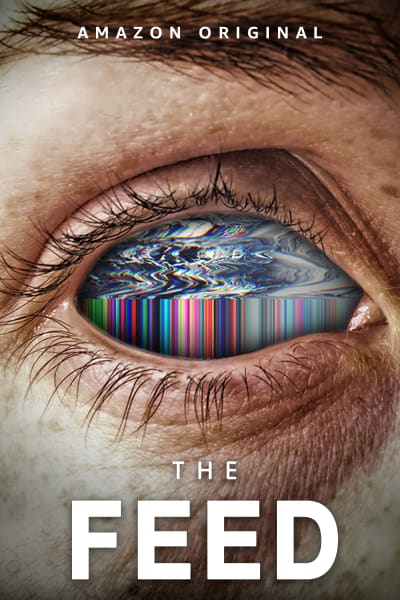The television adaptation of The Feed — based on the novel by Nick Clark Windo — immediately thrusts viewers into a sci-fi psychological thriller set in a future that feels very real and not at all distant.
Talented veteran actors make up the cast of three-dimensional characters who — at least in the six episodes available for review — create solid, believable arcs that posit empathetic flaws into what could very easily have become stereotypical villains types.
While stereotypical villains can be a guilty delight to watch, The Feed takes the psychological intricacies of well-intended beings doing what they feel in their hearts is right, and pushes them through ill-fated journeys of what is perceived as selfishness and greed.
Modern technology is scary; we all know glitches and hackings can be detrimental to corporate and individual security.
When the hard drives, the internet, and all forms of media are placed into heads of civilians, these glitches and hackings can destroy mentally and physically the users who fall victim to the technology.
This is the frightening world in which we are submerged straight away in The Feed.
The convenience of live-streaming or taking photographs with your mind and saving them to a hard-drive of the soul may sound beneficial, but terrifying at the same time.
What’s more frightening: that the voices in our heads might be imagined, or that they might be real?
Those of us who have had our privacy invaded by burglars or stalkers can be traumatized for life.
But the thought of an invader or spy taking space in our heads is utterly unfathomable.
Kate Hatfield (Nina Toussaint-White) — who married into the Hatfield family (the creators and controllers of “The Feed”) — has reason to feel suspicious.
Toussaint-White handles the fear and uncertainty of her predicament with skilled finesse.
But when indications that her newborn, Beatrice, may have been tampered with become more evident, she must risk the well being of her baby and herself by jumping into the deeply dramatic corporate family mudslide that is The Hatfield legacy.
Familial tension drives the drama in what easily could slip into cheesy soap territory in less capable hands.
But The Feed is uniquely fresh with humanity-driven forays into all too familiar technological swamplands where good intentions pave the way to hell.
David Thewlis plays patriarch, mogul, and inventor of “The Feed,” Lawrence Hatfield.
In the first six episodes, his is only one of multiple King Lear-ian tragic arcs.
But by the end of The Feed Season 1 Episode 6, it’s easier to understand and appreciate why and how he became the powerful tech giant he is.
Just when we’re all set to hate him, he surprises us.
Lawrence is convinced he implemented his creation to save mankind. But when “mundles” — or the auto-saved memories and thoughts of all enabled humans (I know, so Black Mirror, right?) — can be accessed by Feed psychologists such as Kate’s husband, Tom Hatfield (Guy Burnet), the question is forced, Who else has access here?
The Resistors are a rebellion group rising up quickly against The Feed and those who are responsible for it.
Their existence makes them easy targets of blame for hacks into The Feed. These hacks are are the new face of terrorism: the cause of casualties, violent outbursts, and even bodily possessions.
I am unable to attest as to whether the TV adaptation accurately represents the novel — I’ve not read it — but I do know it is riveting, thoughtful, intelligent, and perceptive.
The multi-character storylines may feel intimidating at first glance, but by the second episode, their depictions are familiar and honest.
The sexy factor in The Feed is relatively high, too!
The Hatfield brothers Tom and Ben (Jeremy Neumark Jones), in-laws Kate and Miyu (Jing Lusi), and Feed employee lovebirds Max and Evelyn (Osy Ikhile and Clare-Hope Ashitey) bring charm and hot tension, while a gay subplot between young Danny and the puzzling Jonah (Shaquille Ali-Yebuah and Laurie Kynaston) is tender, yet mysterious.
“Ghost” apps like MindSpy, SnuffRoom (fortunately we are not subjected to what happens in that one), and Virtual Companion are illegal Feed programs that automatically leak information to The Resistors.
These are tricky to get rid of — like it or not — and anyone who has downloaded one is in violation.
The app we see most is Virtual Companion, upping not only the sexy factor of the show, but also the melodrama.
With it, one can create a three dimensional avatar of whomever he or she desires, performing any and all deep-seeded sexual fantasies imaginable.
Trying to delete it is hopeless and may lead to heated arguments with an avatar dressed to the nines in stilettos, lace, leather, and whips.
Umm … it may be difficult to imagine wanting to win that argument, but these things can turn nasty, not to mention pixelated! PIxelation is such a turn-off.
The Feed isn’t totally unique. But it is smart, mysterious, and completely entertaining.
I’m looking forward to watching the final episodes of the season myself.
It just might be a dire prophecy of what’s to come.
But it’s also a deliciously revealing account of how well-intended architects of promise cannot stop the debilitating monsters they create.
The Feed drops on Amazon Prime Video on Friday, November 22.
Kerr Lordygan is a staff writer for TV Fanatic. Follow him on Twitter.








